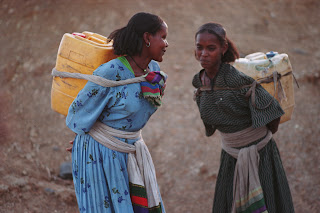My focus for the month of September is water. This topic is as broad as it is complex. I plan on revisiting the topic again in the future, but would like to start with the issue of Clean Water. Imagine waking up each day without access to the following basic human necessities: Safe drinking water, a toilet and soap. According to The World Bank as many as 2 billion people lack adequate sanitation facilitites to protect them from water-borne diseases, while a billion lack access to clean water altogether!
While the conservation of water may not be at the forefront of concerns in American households where water is so plentiful, it it important to understand that much of the developing world lives on a ration of 2 to 6 gallons of water per day - barely enough to flush one toilet in the U.S household, one time. Furthermore, the U.S and Canada also annually continue to use larger quantities of water compared to other countries, a trend exacerbated by our growing consumption of commodities such as jumbo-sized washing machines, automatic garbage disposals and dish washers.
The organizations I chose this month to support clean water are WASH advocacy Initiative and The Bill and Melinda Gates Foundation.
About the Wash Advocacy Initiative
The WASH Advocacy Initiative is a nonprofit advocacy effort in Washington DC entirely dedicated to helping solve the global safe drinking Water, Sanitation and Hygiene (WASH) challenge. Their mission is to increase awareness of the global WASH challenge and solutions, and to increase the amount of effectiveness of resources devoted to solving these problems around the developing world.
With help from WASH Advocacy Initiative, I chose to donate my "voice" to advocate funding towards maintaining WASH under The Water for the Poor Act. I wrote letters to my local congress (find your officials at : www.congress.org) explaining the urgency and much needed support for what is a simple, cost-effective solution with a positive global impact.
Some Background: The Water for the Poor Act makes access to safe drinking water and sanitation for developing countries a specific policy objective of the United States foreign assistance programs. The purposes of assistance authorized by this law are to, "...promote good health, economic development, poverty reduction, women's empowerment, conflict prevention, and environmental sustainability by providing assistance to expand access to safe water and sanitation, promoting integrated water resource management, and improving hygiene for people around the world." Federal funding under The Water for the Poor Act of 2005 has improved millions of lives; for example, in 2009 alone, federal programs improved access to safe drinking water for 6.4 million people in some of the poorest areas on Earth.
While advocating, I found that one of my Representatives of Pennsylvania, Senator Pat Toomey (R) to whom I wrote one letter, is on The Congressional Super Committee (aka. Joint Select Committee on Deficit Reduction). As the Joint Select Committee works to reduce the deficit by over $1 trillion over the next decade, I alerted the Senator that developing assistance programs, including those to provide sustainable access to WASH under the Water for the Poor Act must remain intact by maintaining their funds. International affairs programs are vital to America's overall foreign policy.
I challenge you reader! Please ask our nations representatives for their leadership on this issue. It will help to ensure that the Joint Select Committee protects important investments in our future.
The Bill and Melinda Gates Foundation
While sitting upon mounds of research about clean water and examining various organizations, I couldn't help but notice the huge impact The Bill and Melinda Gates Foundation was making in this "new" venture of global sanitation.
So, what are Bill and Melinda doing? Reinventing the Toilet of course!
The Bill and Melinda Gates Foundation along with USAID's (United States Agency for International Development) Development Innovation Ventures (DIV) are co-funding to launch WASH For Life to support promising new approaches in the Water, Sanitation and hygiene. DIV will use this $17 million partnership to identify, test and transition to scale promising approaches to achieving cost-effective, sustained, scalable water, sanitation and health services to developing countries.
Over the next four years, WASH For Life will identify and rigorously test new WASH technologies and delivery models, and then scale and replicate those that are proven successful. Although project addressing problems in any country may apply, WASH For Life is particularly interested in interventions that:
- Operate in the following priority countries: Bangladesh, Ethiopia, Ghana, Haiti, India, Kenya and/or Nigeria.
- Address issues in the sanitation and hygiene sectors in particular
- Target beneficiaries earning under $2 a day
For your Knowledge and to Spread the Word, here are some WATER FACTS:
- The water and sanitation crisis claims more lives through disease than any war claims through guns. - 2006 United Nations Development Report
- Only 62% of the worlds population has access to improved sanitation - defined as a sanitation facility that ensures hygienic separation of human excreta from human contact. - UNICEF/WHO. 2008 Progress of Drinking Water and Sanitation: Special Focus on Sanitation
- Diarrhea remains in the second leading cause of death among children under five globally. Nearly one in five child deaths - about 1.5 million each year - is due to diarrhea. It kills more young children than AIDS, malaria and measles combined. - Diarrhea: Why children are still dying and what can be done. UNICEF, WHO 2009
- Almost two in every three people who need safe drinking water survive on less than $2 a day and one in three on less than $1 a day. - Water.org
- Constructing a sanitary toilet only costs about $30 US dollars. - Water.org
- More than 80% of sewage in developing countries in discharged untreated, polluting rivers, lakes and coastal areas. - 2004, Wastewater Use in Irrigated Agriculture



0 comments:
Post a Comment